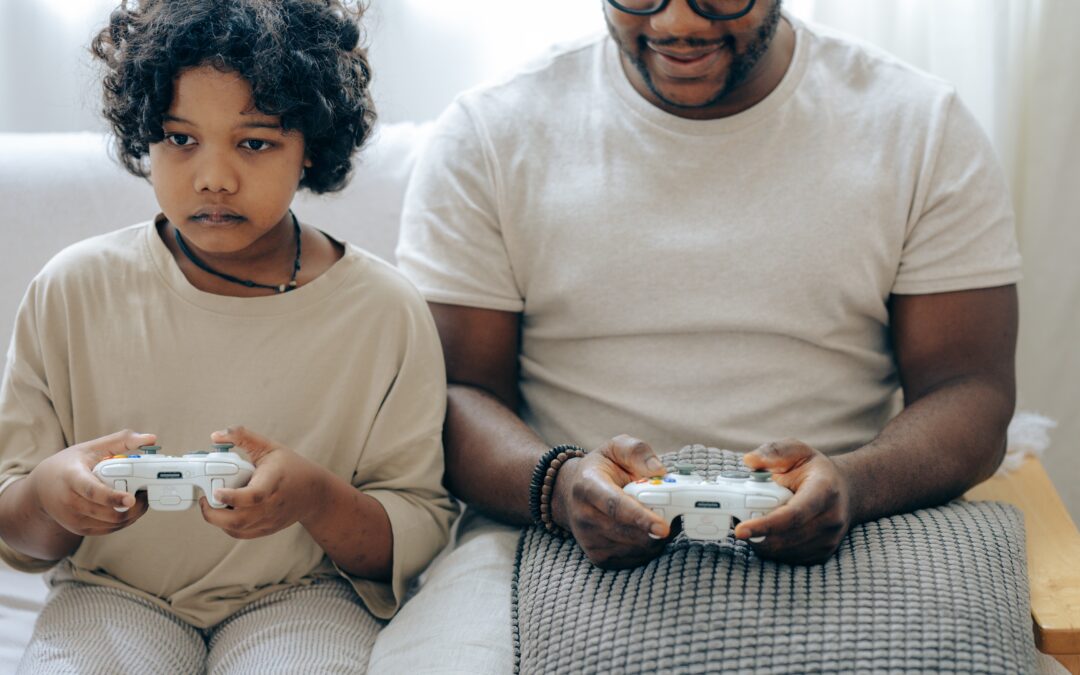Video games are part of modern family and childhood life. They offer a unique way to spend time together and can involve our children in all kinds of topics and activities. From education to deep thinking, or even just the resilience to try again when they fail, most parents appreciate having games around the house.
As with any part of childhood, however, things don’t always go well for everyone. Since video games are new and rapidly evolving media, it can be difficult to find the resources or knowledge to keep things straight and narrow.
Therefore it is important to pay attention to how children balance video games in their life. Questions like these are helpful to consider:
- Is my child physically healthy and sleeping enough?
- Does my child connect socially with family and friends?
- Is my child busy and accomplished at school?
- Does my child pursue interests and hobbies?
- Is my child having fun and learning how to use digital media?
Gameplay and emotions
When children play alone or for too long, it can affect their mood and mental state: frustration, not wanting to quit, or anger can be symptoms we notice in our children when they have played.
While it is an understandable cause of parental concern, it is important to know that these things alone are not a sign of addiction. You don’t have to panic if your child is getting angrier when playing, but you need to pay attention to what is causing this frustration.
If you notice these effects it is important to create time to enjoy the games together. Playing with your child (or watching them play) is a good first step in understanding their gaming mood better. Keep an eye on how they play games. Is it to relax after a busy day at school? Is it to connect with friends? Is it to escape other stresses in their life? Is it excelling at something or gaining social status? Is it that they enjoy the sense of competence?
This can help you carefully separate cause and effect. For some children, it may be the intensity and pressure of competing in the game itself that triggers their behavior. Likewise, their gambling behavior can be a symptom of other pressures in their life.
Understanding this helps guide them to better behaviors without blaming, limiting, or banning games. If they use games as a coping strategy, removing them can make things worse. Like taking out a tasty pasta or meal when someone is halfway eating it, the reaction is surprisingly cross-linked.
Finding a wider range of games to play together can help them find different ways to benefit from the games they play. Particularly younger children gravitate towards more exuberant or exciting games. Introducing relaxing games can allow them to enjoy their hobby with a different frame of mind.
Importance, boundaries and structure
If, after playing together and suggesting different games, your child still exhibits difficult behavior during or after play, it may be helpful to introduce some limitations. However, these shouldn’t be seen as a way to fix the problem in the long run. It is important for children to learn to mediate their play time without parental supervision, so they have healthy habits.
Where limits come in handy, it’s getting some breathing room if playing time is taking over. Using tools on your game console or automatic internet settings with a device is a good way to do this.
You can discuss this with your child and agree on the length of the game together. This allows your child to take ownership and control of their own play model, rather than relying on you to oversee it.
Again, it makes a big difference if you play together. Additionally, some research allows you to introduce a wider range of on-screen activities for them to play.
Avoid bad habits
With the addition of new World Health Organization medical criteria for gambling disorders, it’s easy to assume your child has a medical problem. While a small minority will fall into this diagnosis, most parenting children only care about playing a little too much. It is a parental problem rather than a medical one.
Referring to WHO’s Gambling Disorder is helpful in distinguishing things. WHO states that “for the diagnosis of gambling disorder, the pattern of behavior must be severe enough to result in significant impairment of personal, family, social, educational, occupational, or other areas of functioning and would have been evident to at least 12 months”.
To meet these criteria a child would have to experience negative impacts in crucial areas of their life from play (not going to school, eating right or taking care of personal hygiene), but then continue to pursue and step up their play despite this. Only when this has continued for 12 months do they fall into the space of addiction.
If you find that your child falls within these extreme criteria, it is important to get professional help. While there are many specialized gambling addiction services, look for a holistic approach with empirically sound treatments.
While gambling addiction clinics, Facebook groups, detox camps, and networks eagerly offer help, the danger is that focusing solely on gambling habits can mask other problems. The best action to take is to speak to your GP who can provide you with proper medical advice.
For information, tips and tricks, or would like some support then please give us a call on 0808 123 2820.



Recent Comments